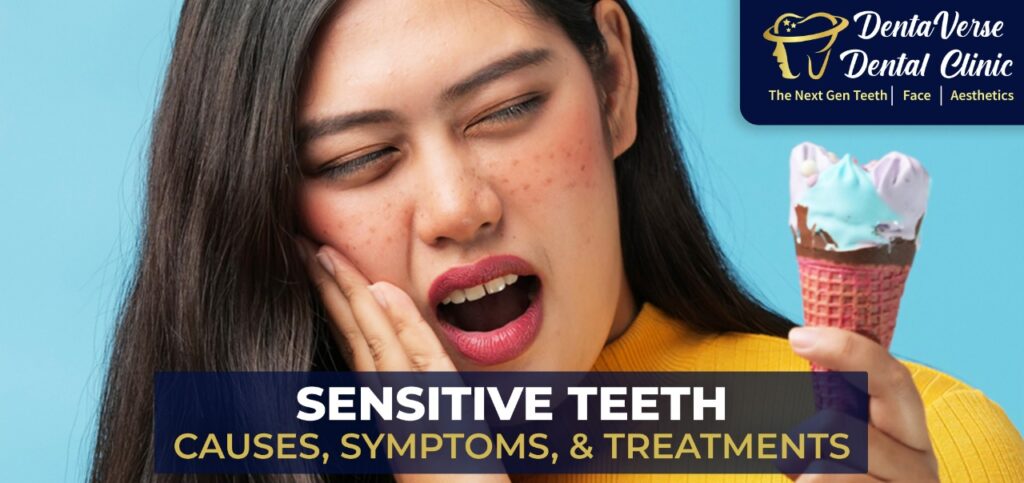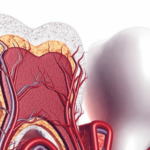
Teeth sensitivity may be to blame if you experience pain or discomfort after consuming cold or hot foods or beverages like ice cream, coffee, or tea. Teeth become more sensitive to hot and cold conditions when someone has dentin hypersensitivity or tooth sensitivity. When eating hot or cold food, those with sensitive teeth experience sudden pain that quickly goes away. Additionally, the majority of research shows that 10–30% of people have sensitive teeth.
One’s suffering from sensitivity-related pain may be either short-term or long-term. Following a thorough examination of your oral health, the dentist will explain the cause of your sensitive teeth. Once he understands the symptoms of your sensitive teeth, he will then recommend a fantastic sensitive teeth therapy. However, this report will assist you in comprehending the numerous reasons, signs, and remedies for sensitive teeth. The best course of action would be for you to avoid depriving yourself or feeling guilty for indulging in your favorite foods due to sensitive teeth.
WHAT IS TEETH SENSITIVITY?
If you have sensitive teeth, engaging in certain activities like eating or drinking something hot or cold can trigger severe discomfort or sensation. Any age range, from children to adults, can experience dentin hypersensitivity. Erosion of the dental enamel or exposure of the tooth roots is the main cause of sensitivity. The impact a sensitive tooth might have is initially evident by sharp pain and discomfort.
Additionally, one should not assume that tooth sensitivity would diminish or disappear on its own. When you feel sensitivity, it is best to see your dentist so they can check your mouth and advise you on how to prevent more issues.
CAUSES OF SENSITIVE TEETH
Poor oral hygiene and a person’s lifestyle may be the main causes of sensitive teeth. Additionally, some people’s thinner enamel can make them more sensitive. The following descriptions of the reasons for sensitive teeth can help you better understand yourself:
- When using a hard toothbrush or applying a lot of pressure to one’s teeth when brushing, tooth sensitivity may result.
- One of the potential reasons for dentin hypersensitivity is tooth grinding at night.
- It could also be a result of consuming a lot of acidic meals and drinks.
- Additionally, gastric reflux may be to blame for the erosion of teeth enamel since stomach acid can reflux into the mouth.
- Tooth sensitivity may occasionally be brought on by poor dental care, or cracked, fractured, or chipped teeth.
- Gum recession exposes the teeth, which can also make them sensitive.
- Because of dental operations like fillings, crowns, etc., your sensitivity may last for a specified period.
SYMPTOMS OF SENSITIVE TEETH
Different temperatures, such as cold and hot, can cause the teeth to experience severe pain or discomfort. Other health issues or illnesses may also contribute to sensitivity that affects other body areas. In addition to foul breath, receding gums, redness, and swelling of the gums are among oral signs of sensitivity.
Various symptoms that can be observed are connected to other body components. Heartburn, indigestion, jaw pain, sinus pain, trouble opening the mouth, and many other conditions can occur. Other extreme symptoms could potentially be a sign of more serious underlying medical issues. As a result, it is usually preferable to contact a dentist when sensitivity is milder and to take preventative measures promptly. The prevention of severe health disorders in the future can be aided by timely dental visits.
CARE FOR SENSITIVE TEETH
You can begin concentrating on your dental hygiene if the sensitivity is not too intense. For sensitive teeth, start out by gently brushing and switch to a soft toothbrush and toothpaste. Choose a mouthwash without alcohol. It’s time to see your dentist if your sensitivity remains despite making these adjustments and practicing good dental hygiene. In order to rule out potential causes of sensitivity, your dentist will look for issues including loose fillings, cavities, and receding gums.
The dentist will make a treatment recommendation after assessing your issue. If you have gum recession, the most prevalent issue, your dentist will advise a gum transplant. The tooth root is safeguarded during this treatment. If you have a problem with teeth grinding while you sleep, he will also suggest that you wear a mouth guard.
CONCLUSION
Make an appointment with a dentist at a reputable dental facility if you or any other family member is experiencing tooth sensitivity. You will avoid future problems and discomfort if you promptly treat your sensitivity. However, compromising on the quality of the treatment will only make your situation worse; as a result, contact a dental office like Dentaverse that utilizes the most recent technologies and equipment, adheres to proper sterilization, and has safety equipment.




